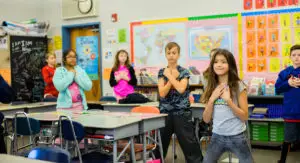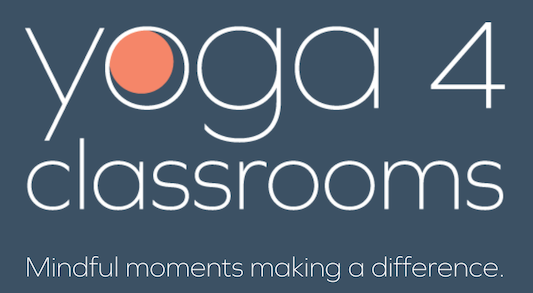
|
Check out our brand new product-- Yoga 4 Classrooms Tee! Wear Your Mindfulness With Pride!
|

Thursday, October 18, 2012 (Updated July, 2021)
Emotional intelligence, social competency, adaptable coping strategies, compassionate and positive attitudes, ability to focus – all these skills are cultivated by the consistent and supportive practice of yoga and mindfulness techniques. Overall, it has been shown by scientific researchers that yoga and mindfulness practices, made developmentally appropriate for use with children of various ages, address the whole child, thus maximizing academic, social, and emotional development in educational settings.
Yoga 4 Classrooms, is anchored in well-validated evidence-based classroom pedagogies, developmental science, cross-sectional research in cognitive-affective neuroscience, tenets of positive psychology, and secular contemplative practices. One of the most important underpinnings of Y4C programming is the social-emotional learning model, which we would like to address in this brief overview.
Social and emotional learning (SEL) is an umbrella term for the process through which children and adults acquire the knowledge, attitudes, and skills to:
These critical social-emotional competencies involve skills that enable children to calm themselves when angry, initiate friendships and resolve conflicts respectfully, make ethical and safe choices, and contribute constructively to their community (Collaborative for Academic, Social, and Emotional Learning, 2005; Elias, Zins, Weissberg, Frey, Greenberg, Haynes, Kessler, Schwab-Stone, & Shriver, 1997; Zins & Elias, 2006).
It’s important to note that SEL is not a single program, but rather a concept that can be integrated by and enhanced by programs such as ours.
As a burgeoning, important field of education research, SEL links students’ social and emotional skills with their academic achievement and overall success. The leading authority in the field of SEL, the Collaborative for Academic, Social and Emotional Learning, CASEL, states on the organization’s website:
“Providing children with comprehensive social and emotional learning programs characterized by safe, caring, and well-managed learning environments and instruction in social and emotional skills addresses many of the learning barriers through enhancing school attachment, reducing risky behaviors and promoting positive development, and thereby positively influencing academic achievement”.
The key concept is creating a school environment that is supportive of and conducive to the healthy social-emotional development of children and healthy mental habits.
A large body of scientific research has determined that effective SEL in schools significantly improves students’:
• Social-emotional skills
• Attitudes about self and others and positive behavior
• Academic performance and attitudes toward school
• Social interactions
SEL promotes young people’s academic success, health, and well-being at the same time that it prevents a variety of conduct problems such as alcohol and drug use, violence, truancy, and bullying.
The short answer to this question is evident by looking at the five core components of SEL which are self-awareness, self-management, social awareness, relationship skills, and responsible decision making.
In line with core goals of social-emotional learning, researchers indicate that short but consistent yoga and mindfulness training exercises, combined with informal mindfulness awareness practices, can strengthen children’s innate capacities for being mindful to any experience (whether pleasurable, neutral, stressful or difficult) in ways that are responsive rather than reactive and reflexive. As Lisa states in the Yoga & Mindfulness in the Classroom Training:
“Consistently integrating yoga and mindfulness-based “mindful moments” throughout the class day is like establishing the foundation of a house. With the skills of self-awareness and self-management enhanced, the other competencies can be built successfully, creating a structure that is more balanced and resilient.”
She goes on to state the analogy applies well beyond the individual child/student but as well to the adults in the school community.
Research continues to show that yoga and mindfulness decrease stress, attention deficit issues, depression, and anxiety in children, and benefit physical health, psychological well-being, social relations, and academic performance. Numerous studies show that sustainably introducing techniques such as yoga and mindfulness promotes social and emotional learning and whole child development.
Clearly, the synergy between contemplative practices and educational programs designed to foster SEL benefits everyone involved. Such practices are now being widely explored in schools and educational systems while the body of published research continues to grow.
Let us support you in integrating trauma-responsive mindful moments into your school day to support student, adult, and school community success and well-being! Learn more.
—
References:
Durlak, J. A., Weissberg, R. P., Dymnicki, A. B., Taylor, R. D., & Schellinger, K. B. (2011). The impact of enhancing students’ social and emotional learning: A meta-analysis of school-based universal
interventions. Child Development, 82, 405–432.
Roeser, R.W. & Peck, S.C. (2009). An education in awareness: Self, motivation and self-regulation in contemplative perspective. Educational Psychologist. 44, 119-136.
Davidson R.J., Dunne, J., Eccles, J.S., Engle, A., et al (2012). Contemplative practices and mental training: prospects for American education. Child Development Perspectives. 6 (2).146-153.
For more overview info on Social-Emotional Learning, visit CASEL.org.
| Cookie | Duration | Description |
|---|---|---|
| cookielawinfo-checkbox-analytics | 11 months | This cookie is set by GDPR Cookie Consent plugin. The cookie is used to store the user consent for the cookies in the category "Analytics". |
| cookielawinfo-checkbox-functional | 11 months | The cookie is set by GDPR cookie consent to record the user consent for the cookies in the category "Functional". |
| cookielawinfo-checkbox-necessary | 11 months | This cookie is set by GDPR Cookie Consent plugin. The cookies is used to store the user consent for the cookies in the category "Necessary". |
| cookielawinfo-checkbox-others | 11 months | This cookie is set by GDPR Cookie Consent plugin. The cookie is used to store the user consent for the cookies in the category "Other. |
| cookielawinfo-checkbox-performance | 11 months | This cookie is set by GDPR Cookie Consent plugin. The cookie is used to store the user consent for the cookies in the category "Performance". |
| viewed_cookie_policy | 11 months | The cookie is set by the GDPR Cookie Consent plugin and is used to store whether or not user has consented to the use of cookies. It does not store any personal data. |

Sign up for our newsletter to get mindfulness tips, classroom tools, and exclusive offers—delivered straight to your inbox.
✨ Join now and get 10% off your first order! ✨